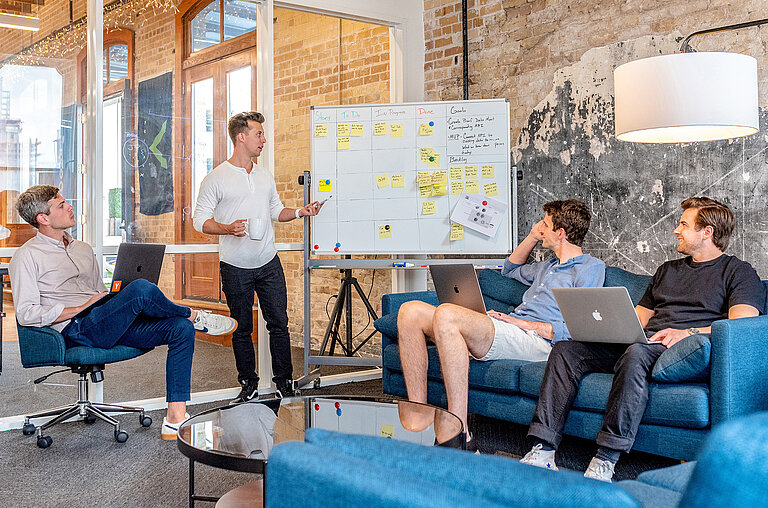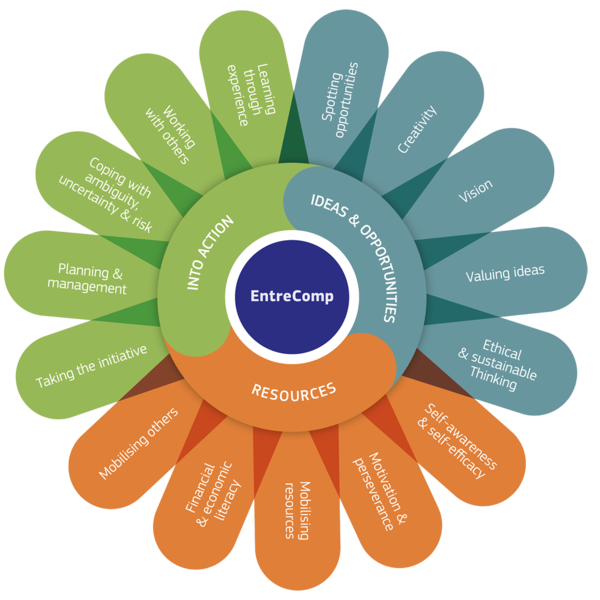
What are the hallmarks of successful entrepreneurs? Which skills do they need? And how can these knowledge, skills and personality traits be nurtured and assessed? The WORLDFACTORY’s “Entrepreneurship Education” team focuses on these questions, because entrepreneurship is a science in itself that needs to be researched, taught and learned.
Expertise and a good idea are not enough to survive on the market in the long term or as an intrapreneur in organisations. This is why the Education Team analyses, systemises and optimises the entrepreneurship courses offered at Ruhr-Universität Bochum. The aim is to provide a full range of scientifically sound, interdisciplinary and practice-oriented courses for all university members. Already, there are many modules that teach start-up skills in individual departments. They are being expanded into an integrated and modularised undergraduate programme. In addition, the Education Team is optimising the further education opportunities and systematically adding to them; moreover, credit options for extracurricular activities are created. It will take some time before the complete programme with modules for each phase of the start-up is ready.

Our current activities include:
- systematically recording and assessing the range of courses in the field of entrepreneurship and start-ups
- developing relevant additional degree programmes where credit points can be gained
- promoting the development and testing of teaching formats in the “Innovative Practical Projects” competition.
- promoting potential founders and start-ups in existing further education formats through Akademie der RUB scholarships
- developing demand-based, modular further education programmes in the field of start-ups
The Entrecomp-Framework
In setting up the course programme, we follow the European reference framework for entrepreneurial competences (“EntreComp”). It is based on a broad understanding of entrepreneurship, which consists of the competence areas “Ideas & Opportunities”, “Resources” and “Into Action”.
Figuratively speaking, this means: Only when the individual petals – for example, self-motivation, team spirit or the founder’s planning skills – unfold, can the little plant of entrepreneurship grow and flourish.
Quelle: McCallum E. et. al. (2018): EntreComp into action: Get inspired, make it happen. A user guide to the European Entrepreneurship Competence Framework. Europäische Kommission, Luxemburg
Ideas & Opportunities
- Spotting opportunities
- Creativity
- Vision
- Valuing ideas
- Ethical & sustainable thinking
Resources
- Motivation & perseverance
- Self awareness & self efficacy
- Finacial & economic literacy
- Mobilizing resources
- Mobilizing others
Into Action
- Coping with ambiguity, uncertainty & risc
- Taking the initiative
- Planning & management
- Working with others
- Learning through experience
LEARNING ENTREPRENEURSHIP AND INTRAPRENEURSHIP
Developing competencies with the "Entrepreneurship" certificate
What do you need to start a business or change it from the inside? Soft skills such as flexibility and the ability to work in a team are important, but so are tangible skills such as financial planning and mobilising resources. You can develop and prove these and other skills with the “Entrepreneurship” certificate.
This certificate is awarded by the Centre for Entrepreneurship, Innovation and Transformation (CEIT) and the RUB Elective Courses for Bachelor Students in cooperation with the Education Team. It is aimed at Bachelor students RUB.
OUR OFFER FOR MANAGEMENT AND ECONOMICS STUDENTS
The Business Model Design Lab
With the Business Model Design Lab (BMDL), the Chair of Entrepreneurship and Innovative Business Models offers students the opportunity to design a business model in collaboration with a regional start-up or a planned RUB spin-off. The students work closely with the founders (e.g. from the WORLDFACTORY incubators) to gain insights into the dynamics of the start-up process. Based on this concept, the chair offers 3 modules: Technology Management (B.Sc.), Start-up creation (B.Sc.) and the Seminar Business Model Innovation (M.Sc.).

INFORMATION FOR TEACHING STAFF
You teach at RUB and would like to introduce a transfer-oriented teaching format in which your students solve practical problems? The university programme “Innovative Practical Projects” focuses on transfer and practice in the form of challenges. Students receive challenges from you and partners from the industry and team up with their peers to develop ideas and solutions for current societal problems. These solutions, for example, respond to the United Nations Sustainable Development Goals (SDGs). There are no limits to the creativity, initiative and innovative spirit of the students in their search for solutions. And who knows? Perhaps the solutions will result in exciting start-up ideas. Would you like to learn more? Read about other successful projects here for inspiration.
Read more about the programme here.
Contact the “Entrepreneurship Education” team
Any questions? The interdisciplinary team from the RUB’s University Development and Strategy Department (Department 1) and the Faculty of Business and Economics is happy to help.

Prof. Dr. Stefanie Bröring
Sub-project Management Entrepreneurship Education

Vivian Peuker-Steinhäuser
Coordination Entrepreneurship Education

Robert Queckenberg
Project Manager Micro Credential Innovation & Entrepreneurship

![Ndjiba Antonio [Translate to English:] Porträt Ndjiba Antonio](/fileadmin/_processed_/b/e/csm_Portraet_Ndjiba_Antonio_dda6654f28.jpg)



